HVAC Training Shop is reader-supported. As an Amazon Associate, I earn from qualifying purchases.
When cold weather arrives, it’s important to have enough heat in your home to keep the chill away. But how do you know what kind of space heater is best?
Buying a space heater is more than just knowing how much heat you need. One critically important factor is how that heat is delivered to your space.
Think of it this way—a sedan isn’t the best vehicle for moving a ton of bricks, just like how an infrared space heater isn’t the best heater for a large empty room.
In this article, I’ll go over 5 different types of space heaters and their pros and cons. I’ll also explain how they work, so you can determine what is best for your space.
Ceramic Space Heaters
Ceramic space heaters are found in a variety of shapes and sizes, and they’re often portable units—making them great for quick heating needs.
They heat up your room by drawing in cool air through a vent in the back, then blowing air over a ceramic heating coil.
A fan pushes air through the heater—so the heat is instantaneous.
Many homes have at least 1 ceramic space heater—used as a backup or temporary heating solution. The main drawback is the noise that the fan makes and the air that it blows around. Some people don’t like it when the fan kicks up some dust.
You should choose a ceramic space heater if you:
- Need Instant heating
- Need a heater that’s portable and easy to move around
- Don’t mind noise from a fan
- Don’t have sensitive allergies
This Lasko Ceramic Space Heater has an ALCI safety plug- so its safe to use in wet areas such as bathrooms.
Oil-Filled Space Heaters
Oil-filled space heaters are a larger, more robust type of heater.
Instead of directly heating the air, the heating coil heats up a reservoir of oil inside a metal radiator.
The oil transfers heat to the metal fins along the heater. The metal fins heat up the surrounding air.
When the heater turns off, it still holds quite a bit of warmth and heats the room.
Since it has that thermal mass, it is able to more precisely maintain a stable room temperature.
Oil-filled space heaters are typically used as a semi-permanent solution. Perfectly suited for spaces that need to stay warm for long periods of time.
You should choose an oil-filled space heater if you:
- Need a heater that can maintain a precise space temperature
- Need a quiet space heater
- Have enough space in your room
- Don’t mind some extra time to start heating
This De'Longhi Oil-Filled Space Heater has a 24-hour timer that's perfect for a "set-and-forget" schedule. It also has an anti-freeze setting so you can use it in your basement to help protect against frozen pipes.
Infrared Space Heaters
Infrared space heaters provide heat in the form of light energy. They provide a few distinct advantages over other types of space heaters since they use completely different technology.
Infrared space heaters work by emitting electromagnetic waves that transfer their energy directly to people and objects in the room. These invisible light waves heat up objects instead of heating the air as traditional heaters do.
Since infrared heaters directly heat objects, you need to be right in front of the heater to feel the heat. This makes them ineffective at heating large spaces.
But if you just need to heat a small area (such as a work area in your garage), then an infrared space heater is the perfect solution.
You should choose an infrared space heater if you:
- Need a heater that can provides instant heat
- Need a quiet heater
- Need a safe heater
- Don’t mind a soft purple glow
- Only need to heat a small area
The Dr. Infrared Portable Space Heater has a thermostat for precise temperature control. It only gets warm to the touch, so it's safe to use around pets and children.
Micathermic Space Heaters
Micathermic space heaters are a cross between ceramic and infrared space heaters (well, kind of). This is because they provide both convective and radiant heating.
Micathermic heaters have a thin layer of mica (a type of rock) sandwiched around a heating element. As the heating element heats up, the mica absorbs some of the heat.
They work by a combination of convection and radiation:
- The air is directly heated by the heating element through convection.
- The mica stone is heated by the heating element, and then emits electromagnetic radiation.
This makes micathermic heaters “the best of both worlds” since they can heat a large space like a ceramic heater, while directly heating objects like an infrared heater. The best part is that a micathermic heater doesn’t make much noise since it doesn’t have a fan.
You should choose a micathermic space heater if you:
- Need to heat an open space where you spend most of your time in one area (such as an office)
- Need a heater with near-silent operation
- Have enough space in your room
- Don’t mind a burning smell while the heater starts up
This De'longhi panel heater has a small footprint, but can also be mounted on the wall if you need extra space. Perfect for multi-directional warmth in any room.
Propane Space Heaters
Propane space heaters are different from all the other space heaters in the lineup since they use propane instead of electricity.
They provide intense heat, directly heating up objects around the heater. They are also extra mobile, able to go anywhere since you don’t need to plug them in.
Propane space heaters burn propane fuel to create a hot flame. They provide both radiant and convective heat.
Propane space heaters should only be used outdoors since they release carbon monoxide—a poisonous gas. That’s why you’ll only find them in places such as backyards and campsites.
You also need a propane tank to run the heater. Although a single propane tank will provide hours of heat, they are cumbersome to carry around.
You should choose a propane space heater if you:
- Need heat in a well-ventilated outdoor area, such as a patio, workshop, or campsite
- Don’t have an electricity source available
This propane heater connects to a 1lb green gas cylinder and can provide up to 5.4 hours of heat—no electricity required.

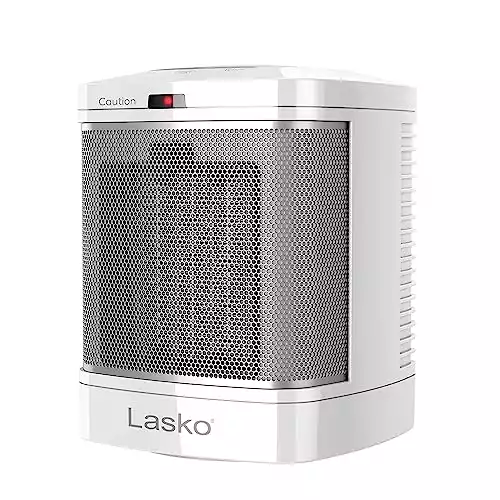
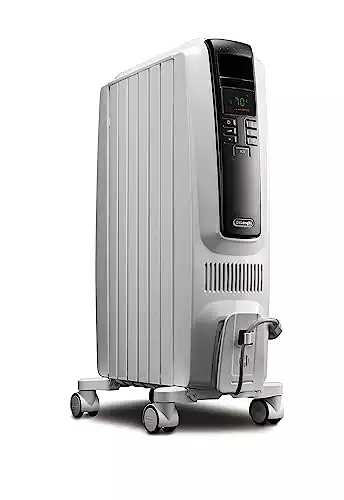
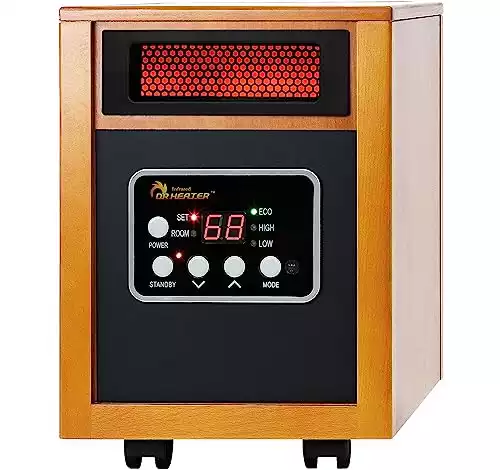
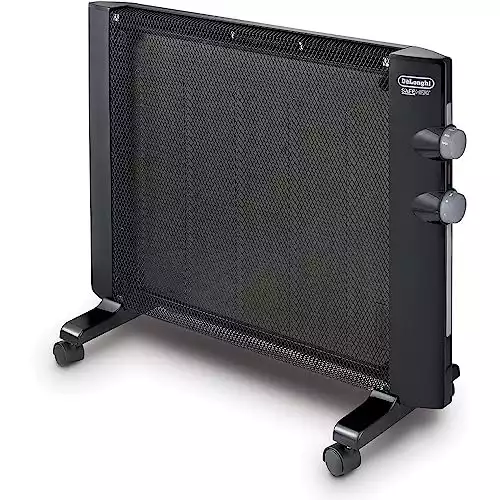
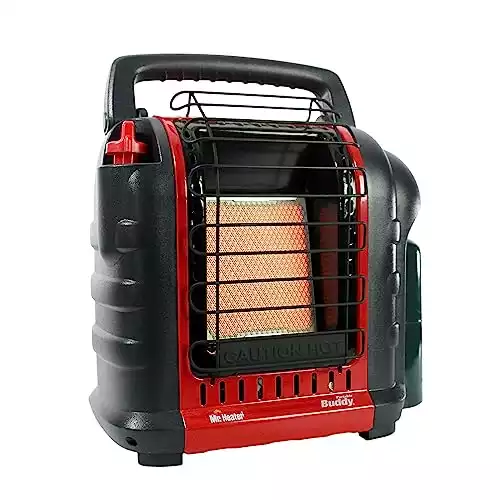



This was most helpful. I was searching for a comparison between infrared quartz heaters and mica heaters and this was the only written comparison I could find. Thank you.